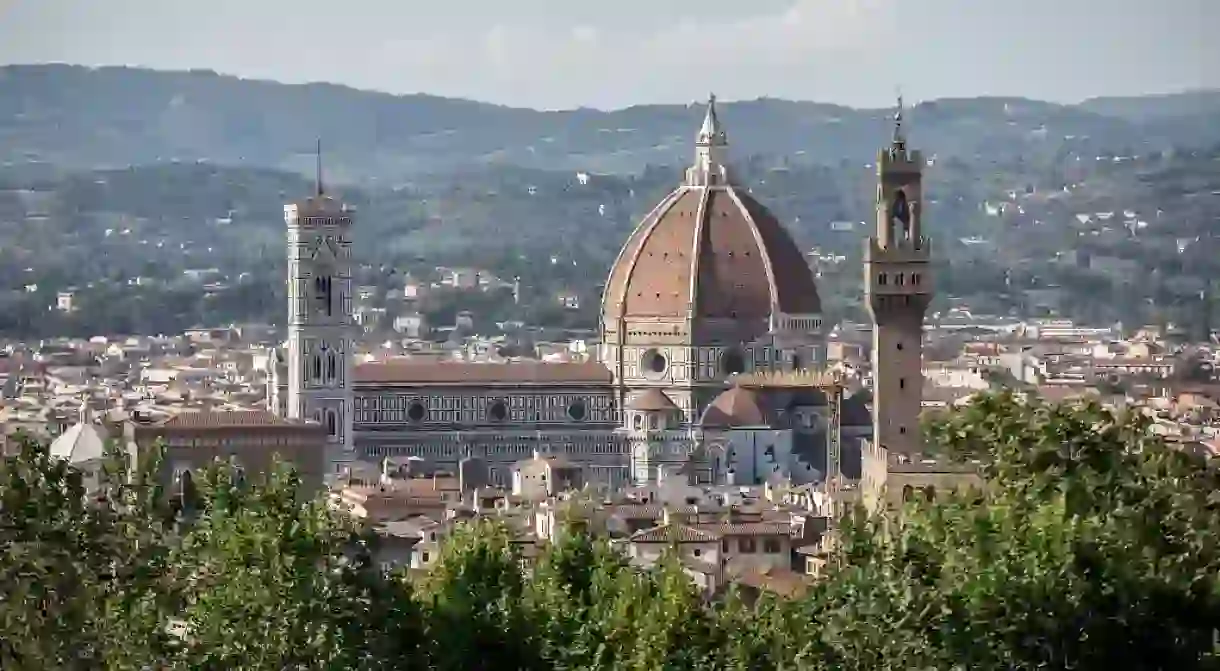Why You Shouldn't Overlook Florence's Contemporary Art Scene

From political art in a 16th-century palace to summer sculpture at a former Renaissance fort, Florence has contemporary artistic treasures at every turn. Art enthusiast, author and Florence resident Nardia Plumridge shares nine of the best spaces to see them.

Florence is a culture capital that has art and architecture at its core. You can easily get lost for days in its array of galleries, a heady mix of classic and contemporary collections housed in some of the grandest buildings in Europe. While first time visitors should cover the must-do museums – like the Uffizi Gallery and the Galleria dell’Accademia – the number of the city’s contemporary offerings has skyrocketed in recent years. Here are nine must-do gallery spaces to enjoy the city’s burgeoning art scene.
Clet Abraham
Art Gallery
A Frenchman who’s been firmly planted in Florence for two decades, Clet Abraham’s name is synonymous with street art in the city. After launching take-overs of street signs, much to the local council’s dismay, his guerilla-style operation has sparked a following of his artistic talents. Clet uses removable stickers to reinterpret street signs, so look up when walking through Florence to find them; they’re designed to add a little whimsy, charm and provocativeness to what, Clet felt, was a uniformed approach to living. A ‘No Through Road’ sign is reimagined to become a crucifix with a hanging Jesus; a ‘This Way’ arrow has been turned into Pinocchio’s nose. In his pocket-sized studio in San Niccolò, you can see and buy his designs, from original artwork to stickers, postcards and T-shirts.
Studio Abba
Art Gallery
The gallery is located on the first floor of Palazzo Rosselli del Turco in hip Florentine neighbourhood Oltrarno. A contemporary gallery housed in an elegant 16th-century Renaissance palace with 18th-century frescoed ceilings that once played host to the embassy of the United States; Studio Abba is a space with no small amount of history. Today, the studio organises collective and solo shows in its home city of Florence, as well housing a permanent collection of paintings and drawings by 20th-century Hungarian artist, Karl Stengel. In addition to this location, curator Vito Abba finds unique and prestige locations to showcase work in other major cities, including Paris, London, Monaco, Tokyo, Venice and Miami.
La Strozzina, Palazzo Strozzi
Architectural Landmark, Building, Museum

Hidden in the basement of one of the finest Renaissance palaces in Florence, the Strozzina showcases multi-media installations and exhibitions that often support the main show upstairs in the main palace halls. The Centre for Contemporary Culture Strozzina (CCCS) was launched in 2007 and since has showcased diverse work from Chinese artists Liu Xiaodong and Ai Weiwei to a recent collection of video art, VISIO. Moving Images After Post-Internet, featuring 12 international creatives all under the age of 35. The Strozzina also organises lectures, workshops, screenings and artist talks through the year.
Villa Bardini
Art Gallery, Museum

Forte di Belvedere
Art Gallery

Positioned on the highest peak of Florence, Forte di Belvedere was built in the late 16th century as a Renaissance military base. Today, it plays host to summer exhibitions of contemporary sculpture that are jotted around the complex grounds. Past exhibitions have included British-born Antony Gormley, Belgian Jan Fabre, and avant-garde Italian artist, Eliseo Mattiacci, while 2019 saw the animal art of Bologna-based Davide Rivalta overlooking the Florence city skyline. Concession-priced tickets are offered to those who have visited Museo Novecento (see below) making a visit to this fort even more enticing.
Casamonti Collection
Art Gallery

Florentine art collector Roberto Casamonti opened his exhibition space in 2018 within the usually private Palazzo Bartolini Salimbeni. Having built an extensive art collection of over 5,000 works since launching Tornabuoni Arte in the early 1980s, Casamonti Collection rotates pieces – its first show hung 250 artworks from the early 20th-century (1900s to the 1960s) with works by Pablo Picasso, Wassily Kandinsky and Andy Warhol on show. Its current exhibition features acquisitions from the 1960s up to the 21st century, including Gilbert & George and Marina Abramović, displayed across six rooms.
Aria Art Gallery
Art Gallery
Tucked down a small cobbled street a block from the Ponte Vecchio, curator Antonio Budetta promotes new artists and ideas with his temporary shows housed within a shed-like structure with a hidden botanical garden from circa 1534. With exhibitions by artists from America and China to the Middle East, Aria’s offerings often mix the classic with the contemporary: a current show, Timelessness, boasts 16th- and 17th-century masters exhibited alongside contemporary pieces to challenge the “descriptions imposed by the History of Art” and to enrich “ancient and contemporary masterpieces with new meanings.”
Gallery of Modern Art, Palazzo Pitti
Museum

Museo Novecento
Museum













